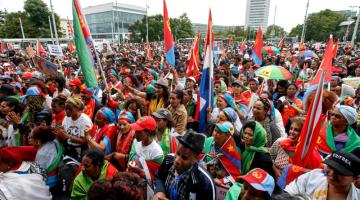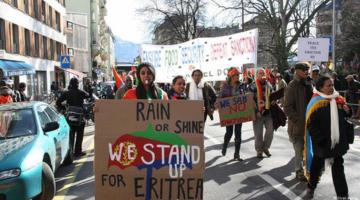Brigade N'Hamedu riot at an Eritrean festival in The Hague, 2024.
The Washington Post’s latest anti-Eritrea propaganda demonizes Eritrean immigrants defending themselves in the West.
The US has a lot of problematic friends in the Red Sea region, most notably Saudi Crown Prince and Prime Minister Mohammed bin Salman (MBS). Along with his habit of chopping off heads and having them hung in the public square, MBS is credited with having journalist Adnan Khashoggi dismembered with a bone saw at the Saudi Embassy in Istanbul. Saudi Arabia has performed a record 213 public executions this year.
More Gulf monarchies distinguished by hair-raising human rights violations and even modern-day slavery include the United Arab Emirates, Bahrain, Kuwait, Oman, and Qatar. Like Saudi Arabia, they all prop up the petrodollar, host US military bases, and purchase vast lethal supplies of US weapons, and all but Qatar backstab Palestine. None could disembowel enough kittens to fall afoul of US sanctions.
And then of course there’s Israel.
Just south and west of this ghastly pantheon is Eritrea, a Red Sea nation that defies the dictates of Western powers, pursues egalitarian social development, eschews IMF and World Bank debt, demands a fair price for its natural resources, and refuses to collaborate with AFRICOM, the US Africa Command.
Not surprisingly, Eritrea is heavily sanctioned by the U.S. for alleged human rights abuse. Exclusion from the SWIFT system for conducting international financial transactions puts it in the exclusive company of the West’s other favorite bogeymen, Iran, North Korea, and Russia.
Western politicians, pundits, and press relentlessly castigate Eritrea—never mind their headchopping friends across the Red Sea—with the most recent salvo coming from the Washington Post. The Biden Administration trained its soft power sights on the country, and this comes in its waning days.
The Post’s Nairobi correspondent, Katharine Houreld, authored the hit piece titled “How a tyrannical African country freely raises money in the U.S.” She notes that the US sanctioned Eritrea’s ruling party in 2021, alleges that the ruling party and the government are one and the same, and worries that it might be illegal to fundraise for a US sanctioned country in the US, citing anonymous experts who “said the practices deserve closer scrutiny, including the role played by nonprofit groups.” A US government Fact sheet says it’s legal to send humanitarian assistance to Cuba, which has been under US sanctions since 1962, so this threat of “close scrutiny” appears intended to intimidate Eritrean Americans.
At least 14 nonprofits raise money to be spent in Israel, including two, Israel Friends and Friends of the Israel Defense Force (FIDF), who raise funds directly for the IDF. That’s just for the record, given that Israel is of course not sanctioned by the US.
Fundraising for a lawsuit to protect Eritrean Americans
A careful read of Katharine Houreld’s piece makes it clear that very little of the fundraising it decries is about funds to be spent by the Eritrean government or even to be spent in Eritrea. It's about a Zoom call which she claims was intended to raise money for a lawsuit against people who’ve attacked Eritrean Americans at cultural festivals and events here in the US, specifically for their attack on the Eritrean American Festival in the Seattle-Tacoma area in August 2023. Houreld also mentions past fundraising for COVID relief and cancer care in Eritrea.
I attended the 2022 Eritrean Festival in Dallas, where someone gave a presentation on delivering improved cancer care. People in the audience then stood up, one after another, glowing and eager to announce contributions on behalf of their local Eritrean American communities.
There was no fundraising of any sort at the 2023 festival in Seattle or the 2024 festival in Washington DC.
Houreld also writes that these are festivals "where women in diaphanous white dresses twirl in traditional dances, pro-government musicians croon before rapt audiences, and attendees feast on steaming bowls of Eritrean cuisine." Oh . . . My . . .God. Sounds like fun. As one Eritrean American responded on X, “We don’t need the government or the Washington Post’s permission to have a good time!”
Houreld is writing about the Seattle festival from Nairobi, but I was there. The hooligans arrived at 6 a.m., waking us up to loud sounds of destruction and gunshots. They tore down exhibition tents, vandalized property, even set Eritrean dresses on fire, and paraded around waving American flags and blue-and-green Brigade N’Hamedu flags. They later sent several festival goers to the nearest emergency room.
Many Brigade N’Hamedu militants seem to have emigrated from the Tigray Region of Ethiopia, which lost its 2020-2022 war with the Ethiopian government aided by Eritrea. Others seem to be Eritreans from near the border between Tigray and Eritrea who identify as Tigrayans.
Western countries give special preference to migrants from Eritrea, as they do Cubans and Venezuelans, in an attempt to depopulate those countries of their gifted and educated youth. The Daily Mail recently published an exposé about Tigrayans on TikTok, bragging that they had managed to “con their way into Britain” by claiming to be Eritrean and “sharing huge swathes of training material to convince case officers they are from Eritrea.”
At least three individuals named in the EAGS lawsuit are of Tigrayan origin. Temesgen Kahsay, a named defendant who identifies as Tigrayan, openly admits on social media that “a large portion of the Eritrean opposition are Tigrayans. Others are Tigrayan by their mother or father’s ancestry lines.” This statement is supported by ongoing investigations. For example, in Germany, where the first attack occurred in a parliamentary hearing, German politician Jörg-Uwe Hahn notes that “the perpetrators of violence are violent groups led by the probably extremist organization 'Brigade N'Hamedu' from Tigray (Northern Ethiopia)." The narrative that Eritreans are “clashing” continues to erode.
The militants are on a mission to undermine and violently attack Eritrean expat communities throughout the West, from Stockholm to Seattle and even Tel Aviv. In 2023, they attacked festivals and events in those cities and in Giessen and Stuttgart, Germany, London, Toronto, Calgary, Edmonton, Denver, Dallas, St. Louis, and Atlanta. In 2024, they attacked in The Hague, Breslau, London, Indianapolis, Charlotte, and again Tel Aviv (church service) and Atlanta.
The group openly operates with a “Plan A” to warn municipal authorities and venue owners that there may be violence and prevent them from granting permits for Eritrean-themed events. Their “Plan B” is to attack the events if that fails.
At the beginning of her essay, Katharine Houreld writes, “Earlier this year, for example, about 100 Eritreans living across the United States joined a Zoom call co-hosted by officials from the Eritrean Embassy aimed at raising money to support their country’s struggle against its opponents,” which of course sounds repressive. No government should struggle against its opponents, should they? Especially not against opponents favored by the US government, opponents who might even be attempting a color revolution.
“The Eritrean chargé d’affaires,” Houreld continues, “pressed those on the call to hold their own fundraising events and to urge fellow members of the diaspora to contribute as much as they could.”
It then takes Houreld another eleven paragraphs to acknowledge that the fundraising that she believes took place on this Zoom call was neither for money to be spent by the Eritrean government, nor even to be spent within the borders of Eritrea. She believes that it was instead to be spent by the Eritrean Association in Greater Seattle (EAGS) in support of their legal complaint against the hooligans who attacked their festival.
“The Eritrean officials on the call said the money, in this instance,” she finally writes, “would finance a lawsuit in the United States against demonstrators who had been protesting against Eritrean government abuses.”
Demonstrators protesting? Brigade N’Hamedu proudly documented their own EAGS festival riot on social media livestreams and then posted it to a YouTube channel. A number of the defendants in the lawsuit can be easily identified in the video.
Unlike the constant stream of Western media propaganda demonizing Eritreans, Brigade N’Hamedu’s violent attacks are creating evidence that they are violating the laws of host countries across the West.
As earlier reported here, investigations of the many 2023 attacks are underway, and in Calgary, 28 people have been indicted on 63 criminal charges.
Calgary Chief Constable Mark Neufeld told local news, “We’re not policing ideologies. We don’t get on one side or the other of this. This is around behavior for us, and so the behavior that we see in the videos and the reporting of this is the very same behavior that we’ve seen in other cities, and it’s not OK. It’s not OK in our city.”
Neufeld also said that these were not clashes between two groups but violent attacks by one group upon another.
The list of Brigade N’Hamedu attackers who have been indicted and/or convicted keeps growing. Hundreds have been arrested and charged around the world. Global kingpin John Black was sentenced to four years for the Hague attack.
Notable charges in the USA, include Kidane Woldemariam, who faces felony assault charges with a deadly weapon; he allegedly shot Eritreans at a peaceful event in November 2023. Haile Tseada, a defendant in the EAGS lawsuit, was arrested and charged with assaulting Charlotte police in the February 2024 riot.
There have been no more attacks since the EAGS filed their federal complaint.
Another lawsuit based on the federal Racketeer Influenced and Corrupt Organizations Act (RICO), which makes it illegal to participate in organized crime, is in the works.
Ann Garrison is a Black Agenda Report Contributing Editor based in the San Francisco Bay Area. In 2014, she received the Victoire Ingabire Umuhoza Democracy and Peace Prize for her reporting on conflict in the African Great Lakes region. She can be reached at ann@anngarrison.com. You can help support her work on Patreon.



















